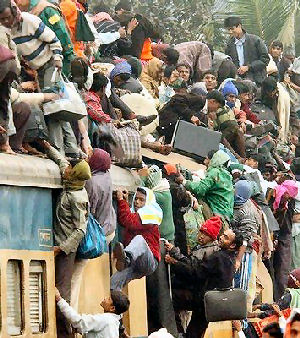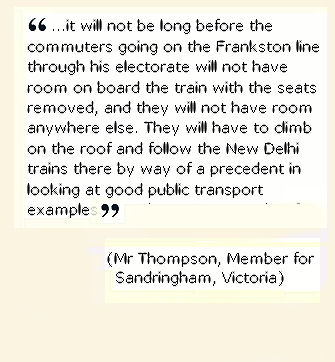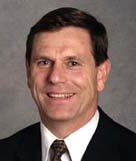

No room at nature's feast? How do governments deal with catastrophic mistakes?
How does a government deal in parliament with something embarassing but also catastrophic, like its total loss of control over a program for forced population growth? Only a few years ago, this was the kind of question one might apply to Mexico or Jakarta, but now, most unhappily, it applies to Melbourne.
Matter of Public Importance
On Wednesday, 16 April 2008, at a session known as "Matter of Public Importance" in Victorian Parliament, Ms Green, Member for Yan Yean set the topic.
Under the general heading of "Government: performance", Ms Green's "Matter of Public Importance," was:
"That this house congratulates the Brumby government for ensuring Victoria is the best place to live, work and raise a family for a million more Victorians."
Big Barbecue
In an understatement which should go down in history, Ms Green went on to describe how the way Victorian government's population drive has gone into massive overshoot was really like a big barbecue where too many guests came too early.
"At the outset I referred to the 1 million additional people coming to Victoria. In 2001, when we delivered our 2030 plan, we were planning for that level of growth to occur by 2030 but, because of the popularity of our state and what this government has done with its infrastructure and its people, it is now expected that the population growth predicted in 2001 is actually going to be here in 2020 rather than in 2030. To express it in terms that those opposite would understand - 2020 is only 12 years away - it is like 1 million people coming around to your place next Sunday and expecting a sausage at a barbecue. (...)."
She then burbled on to say that "We have to prepare for that growth. We have to be welcoming to those people who will come here. (...)"
"We" have to be welcoming
"We" have to be welcoming. Hmm. And just who invited all these people, Ms Green? Does the member for Yan Yean intend to put them all up in her back room or something? Is Mr Brumby going to lodge them all on his wife's farm? Maybe members of the Brumby Government are going to give out a million permits to camp in the treasury gardens. Mr Bracks and Mr Thwaites may have retired into big business, but they did send out a lot of the invitations to the barbie before they scootled. So they really do need to open up their homes to the overflow, and perhaps give up their children's places in schools and universities to newcomers, to show they are really welcoming. I am sure there would be plenty in the community prepared to help them pack and leave some room for the rest of us, and maybe a bit of democracy as well.
Ms Green continued, mentioning, among other things, that "Well-known and respected demographer Bernard Salt" has projected that "in the late 2020s Melbourne will again become Australia's largest city. This means that we have had to make some changes to our planning systems."
Bernard Salt is a salesman for growth to the people who market products, Ms Green. Will the Victorian people be able to hold him accountable for decisions which you and the rest of the government may make on his advice? Don't forget that, we, the people, on the other hand, have an entire department full or professional statisticians called the Australian Bureau of Statistics. Why don't you consult them? They are actually independent sources without any vested interest in growth. They are there to inform governments and we paid for them with taxes just so you could consult them.
Ms Green: I welcome the Premier's recent announcement of zoning changes ...
Ms Green continued. "I welcome the Premier's recent announcement of zoning changes and the speeding up of zoning within the urban growth boundary which will allow Melbourne to accommodate family growth. Those changes mean that about a year will be taken off the time required for building lots to come onto the market."
It sounds to me as if Ms Green has been introduced to some of the government's associates, possibly from the Property Council of Australia, or APop, or maybe she has had some contact with the Multicultural Foundation or the Scanlon Foundation, or ATSE (although they seems to be more for Federal Politicians).
This barbecue is sure going to cause us all a lot of inconvenience. I wonder if it's really worth it just to sell a lot more chops and sausages?
After a lyrical excursion into the wonders of a Stockland development where she had opened a new road called Mernda Village Drive, and the Catholic community there, the preservation of the river gums, (but not the kangaroos; this is an area known to the Australian Wildlife Protection Council as a wildlife-catastrophe zone) Ms Green (Yan Yean member) concluded her paean to out-of-control population growth:
"I commend this matter of public importance to the house. It is important that we are forward-looking and do not sit on our hands and say, 'Well, we will say “G'day” to these people coming round to the barbecue on Sunday'. We have to do more than be welcoming, although I know Victorians and Melburnians are welcoming.
With the usual logical irrelevance, she adverted to cultural diversity, marketed by successive Victorian governments as an unassailable justification for the high rate of immigration which has impacted in homelessness, wildlife devastation and the disorganisation of communities:
"We are a very culturally diverse community, which is another reason why people are moving to the state."
She insisted unreally: "We are a government that is forward-looking, investing in these people and being welcoming, while retaining our livability at the same time."
'Livability'; a vexed concept
Well, not everyone agrees on this point of retaining our 'livability'.

The member for Ferntree Gully, Mr Wakeling, exclaimed, "How disappointing that, with all the things the government could deal with in this house - the problems with public transport, problems with the health system, and the problems with education - the most pressing issue it can find facing this state at the moment is to congratulate the Brumby government on making Victoria the best place to live, work and raise a family.
"What a disgrace; what an absolute sham! For those people expecting this government to start listening to the concerns of the Victorian community and identifying ways to improve our services, this is the best that those opposite can come up with," he said, referring to the members in government as 'those opposite'.
(...) "I will tell members one thing: it is the worst place to live, work and wait for a delayed train. It is also the worst place to live, work and have reduced police on our streets; the worst place to live, work and be stuck on a trolley waiting for surgery; and the worst place to live, work and be educated by this country's lowest paid teachers. Those opposite should hang their heads in shame. While those opposite sit and laugh about the plight of teachers and about the problems besetting public transport, police and other important issues in this state, we on this side of the house are out there listening to the concerns of the community and expressing those concerns in this house. I call upon those opposite to follow the lead and to take on board the concerns of the Victorian community." (...)
"I will touch very briefly on the member for Yan Yean's comments about Melbourne 2030. What an unmitigated disaster! Melbourne 2030 is the planning blueprint to take the state forward to the year 2030, but the government made one slight mistake: it got the figures wrong. It was not one year out, it was not two years out, it was not three years out - -"
Mr Burgess (Member for Hastings) asked, "How many?"
Mr Wakeling replied, "It was 10 years out - in its own 30-year plan. What a disgrace! Melbourne 2030 is predicated on infill development and unit development in local communities. It was going to include the provision of upgrades to infrastructure - that is, public transport." (...) "My community got the worst of both worlds. It got the infill development and, more importantly, it did not get any public transport."(...)
Mr Northe, the member for Morwell, pointed out some more of the costs of population growth:
(...) "The assertion is that in the near future Victoria will have a population growth of some 1 million residents. That begs the question of how well Victoria is positioned to cater for those future additional residents, and from my perspective, what impact it will have on the growth of regional Victoria. Of course population growth equates to an additional demand upon essential services and infrastructure, and issues arising from that have been highlighted in recent times.
"They include the congestion on our roads, the overcrowding on our public transport, the waiting lists in our health system, the shortage of police resources, and disputes that are ongoing with the nurses, police and other public servants.
"An increase in population will create additional pressures in all these areas and will create increased demand for electricity, gas and water." (...)
"The Minister for Health (...) would be well aware of the growing waiting lists and the statistics that unfortunately are worsening with each revelation that comes out through the statistics. With population growth comes an additional demand on our health services. That is indicated by the population growth within Traralgon and the Latrobe Valley in recent times. It has put an enormous burden upon our hospitals and community health centres. That is indicated and verified by some of the statistics that are produced, not only by the Latrobe Regional Hospital, but also the Latrobe Community Health Service, and particularly the dental waiting list over time. It is very difficult for us to try to attract and retain health professionals in rural areas. So as the population grows it is imperative that we have systems in place to attract people to the health-care system in regional areas."
(...)
"Recently we have seen disputes with the police about the lack of police resources. I talk to police officers in my local area on a regular basis; they inform me they are struggling to make ends meet. They do not have the opportunity to be on the beat, where they should be, to protect the community, and they have grave concerns about that.
"An example is the town of Churchill, which has a population of somewhere in the vicinity of 5000 people, and does not have a 24-hour police station. That is of grave concern to the community of Churchill.(...)"
(...)
Mr Thompson (Sandringham): "'Victoria is a great place to live, work, raise a family and speak in clichés"

Mr THOMPSON, the member for Sandringham's speech indicated that he perceived a certain slickness in the Matter of Public Importance (which was, you may recall, "That this house congratulates the Brumby government for ensuring Victoria is the best place to live, work and raise a family for a million more Victorians"). He claimed that, "One of the great political lies perpetrated on the Victorian people in the last decade was the Labor promise that it would build the Scoresby freeway, the EastLink freeway, toll free. Victorians for the next 30 years will be paying an exorbitant amount as they commute from their local suburb. The matter of public importance (MPI) today really should be under the heading of a grievance motion. The topic is that the house congratulates the Brumby government on making Victoria a great place to live, work and raise a family for a million more migrants. Fundamentally it should be retitled 'a great place to live, work, raise a family and speak in clichés', because that is what the Labor Party regularly does and treats this house with disdain.
He gave many examples:
"We have seen other jurisdictions around the world where people speak in clichés. They speak in mottos - be it China, be it the Soviet Union or other regimes around the world. It makes a mockery of this Parliament to parrot these clichés on a regular basis. If one googles the phrase, one will find how many other countries around the world use the cliché, the phrase 'a great place to live, work and raise a family'. I could refer to the United States of America and the town of Annapolis, where the residents regard it as the 'greatest place to live, work and raise a family'. One could go to the area of Cary in the United States, where the locals promote their town and region as the 'greatest place to live, work and raise a family'. One could go to the township of Saskatchewan in Canada, where the state is promoted as the 'greatest place to live, work and raise a family'.
He went on to name more examples, finishing up with Amityville:
"(...) One could go to Amityville - I understand there is a film called the Amityville Horror - where again people find it to be the 'greatest place to live, work and a raise a family'. It may be from this very township that the spruikers for the Bracks and Brumby governments found the phrase in a Hollywood film script. (...)
"(...) The Labor Party is speaking in clichés. It makes an absolute mockery of this chamber. In terms of the matter of public importance before the house, we as Australians should value the opportunity to live in a wonderful country which allows us freedoms and advantages not experienced in many other parts of the world.
"(...)The member for Bentleigh was speaking about public transport, and it will not be long before the commuters going on the Frankston line through his electorate will not have room on board the train with the seats removed, and they will not have room anywhere else. They will have to climb on the roof and follow the New Delhi trains there by way of a precedent in looking at good public transport examples."
(...)
Thompson: "Do I believe this state has the capacity to absorb a million new migrants in the short term?"
"Do I believe this state has the capacity to absorb a million new migrants in the short term? I do not believe so. Why is that? I will outline why. We are still waiting on the delivery of better water infrastructure, better roads and better public transport, real tax reform, and a vision for manufacturing which will provide a fundamental employment base for Victoria, drawing on our energy reserves."
(...)
"(...)We have water shortages that have not been envisaged by the current government. It has been in office for 19 out of the last 26 years in this state. There was provision for better water infrastructure 25 years ago, but the Labor Party has failed to deliver."
(...)
"We need a plan for our electricity supplies and to make clean use of our coal resources, but we have seen recently a decline in the service reliability of power companies. A number of senior citizens in my electorate experienced power blackouts for 48 to 72 hours. We need affordable housing." (...) The Brumby government refuses to recognise the effect of the huge stamp duty windfalls as part of this process. We have the highest stamp duty in the nation. The government continues to collect the money and impose that burden affecting the fertility rate of the next generation and the ability of working families to maintain an affordable quality of life in addition to meeting their housing repayments.
"Looped into their mortgage repayments is the money borrowed to meet the stamp duty commitment.
"Public housing lists are blowing out, with no addition to the public housing stock. There is a disability housing crisis. We confront as a community increases in the cost of petrol, water, power and food, and these are adding to the household budgets of Victorians. The housing boom on the fringes of Melbourne requires hundreds of extra doctors and hospital beds and dozens of new schools as well as billions of dollars in infrastructure spending to supply new roads, public transport, schools, hospitals, shops and child-care centres, but there has been a lack of planning on the part of the Bracks and Brumby governments to provide appropriately for these needs." (...)
And so on.
Look, just before all the members of government give up their homes, and go out into the wilderness to make room for the guests at the big barbecue, could I suggest that someone responsible should consider putting a message up here, on the Government's immigration site, saying, "Immigration program cancelled indefinitely due to overshoot of oil, water, shelter, and soil?"
Source of parliamentary dialogue:
www.parliament.vic.gov.au/downloadhansard/assembly.htm, MATTER OF PUBLIC IMPORTANCE, ASSEMBLY Wednesday, 16 April 2008, beginning at p.1274

Comments
Anonymous (not verified)
Fri, 2008-07-25 20:29
Permalink
Diversity? More like colonisation!
Add comment